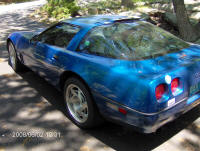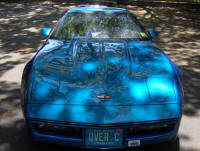RIKLBLOG
|
| Tomorrow |
| 10 Dec. 2008 |
| Yesterday |
| Index |
| Eventide |
| SETI League |
| PriUPS Project |
| Bonus! |
| Contact |


Computer Programming for Fossils
Today's musing: Do people still program computers?
But First, a Fossil Alert
Me fossil. Whenever I tell the computer what I want it to do in some more-or-less logical sequence that it will take care of itself, I consider myself to be "programming." If someone who actually does this for real were looking over my shoulder, I think he'd say in the current jargon that I'm "writing software." I'm not so sure he'd be correct.
My Clever Marketing Idea
I set myself a task the other day. It was very similar, I realized almost immediately, to a task to which I set myself about two decades ago. Since the older task was both more difficult and more clever, I'll describe that instead of the recent one. Circa 1988 my company introduced a product for air navigation called the Argus moving map display. On the one hand, this was a revolutionary product, well suited for inclusion in almost every small airplane, and for purchase by almost every licensed pilot who owned an aircraft. On the other hand, we as a company were totally unknown in aviation circles, and faced a deep gravity well compared to well-known manufacturers such as King, who were the gold standard of the market although they had no product even remotely like ours. As a newcomer with an expensively developed product, we were eager to sell some as quickly as possible. As Prof. Lobachevski's admirer is reputed to have said, "This, I know from nothing." There were hundreds of thousands of aircraft registered, and 3/4 million pilots or so. The magazines that catered to them had high advertising rates. What I wanted to do was advertise effectively only to aircraft owners who were likely to be gadget lovers and therefore interested in a new and unfamiliar, albeit very compelling product. There is no "Flying for Aircraft Owner Nerds" magazine, not even now.
Remembering the words of the great Lobachevski, I came up with my own idea nonetheless: Why not cross-reference aircraft owners—actual individuals, not corporations, with the country's amateur radio (ham) operators, a notorious bunch of science toy fans if such there ever was? Why not indeed? One reason was that there was no "database of hams who own airplanes." Even though the federal government licensed both activities, the FCC and FAA didn't talk to each other except to argue about radio towers. "Towers good!" says Mr. FCC. "Maybe, but don't put them near my airports" rejoins Mme. FAA.
1988 was near the beginning of the time that you could purchase compact disks full of data. The FAA provided pilot and aircraft registration data on 9-track tape to private industry, which repackaged it and sold it on CDs. The FCC likewise provided amateur radio operator listings to companies such as Buckmaster who offered the "Ham Call CD" at a modest price. There was no internet outside academia, and certainly no free downloads as there are today. I bit the polycarbonate and purchased the data disks. To make an interminable story less so, I managed to transfer and compress the data into my old HP Unix computer and its 300MB, 30lb hard drive. Using all manner of strategies involving names and ZIP codes and groups of files (since the computer had a few megabytes of memory at best), I managed to produce a cross-reference of ham call signs with aircraft registration numbers. It was only a tiny cross section (about 2,000, as I recall) of aircraft owners, but I theorized that they would be early adopters of our product.
I put their ham call letters in bold type on the front of the envelope, making almost certain that they'd open it. Imagine their surprise when they opened it and found a brochure for a product for their airplane! I added a "personalized" letter espousing my theory that hams love gadgets, and what is an airplane but a big gadget that also happens to take you places for really expensive hamburgers.
Was the campaign successful? I believe so. We got a number of responses, made a number of sales, and even received a few comments on the campaign itself. One response actually used the word "clever," so I don't have to feel that only I liked at least one of my ideas.
My Not-So-Clever Computer Program
The point of all the above is not to show that I once had a clever idea. Although, in fact, I did, at least once have a clever idea. The point is that I did all this with a computer program. The program manipulated "strings" and said things like "IF/THEN/ELSE," and, even, Turing help us, "GO TO." That's what we had in those days, along with disks measured in the low-ish megabytes and memory with even fewer MB. Anybody looking then would have agreed that I was programming, i.e., giving the computer a logical sequence of steps to arrive at a desired result. As far as I know, the program was "bug-free" in the sense that I could operate it and, at least to the extent of the quality of the data, it gave me hams who owned aircraft rather than florists who decorated floats. (Not that some florists aren't hams. Or even pilots.)
I don't fancy myself a "computer scientist." I've long held the theory that computer time is less valuable than my own, and I can show you a "bubble sort" to prove it. Nobody would disagree with me after seeing anything I have done. (And, you thousands of millireaders of my blog will have noticed that I'm not a graphic artist, either.) But computer programming was something one could do without being a specialist. When I got my HP 9845 computer, it came with a manual that was comprehensible by mortals and printed on actual matter. Subsequent computers such as the HP Unix machine mentioned above were usually accompanied by several times their weight in documentation, but it was still verging on readable.
Why I Have Trouble Writing Software
 As
could be said about the priceless Steinway: "Not any more."
I could babble about the incomprehensibility of even the simple New
Words of Computing such as "classes" and "methods." And I could
complain about the uselessness of the manuals that have to be purchased
separately. But I won't, because I found the perfect visual aid.
MSDN is the magazine for people who "develop" with Microsoft Windows,
Visual Studio, SQL, and a host of other "tools." I remember the
first time I bought a PC rather than an HP technical computer. I
made the stupid assumption that I could "write programs" on it.
As
could be said about the priceless Steinway: "Not any more."
I could babble about the incomprehensibility of even the simple New
Words of Computing such as "classes" and "methods." And I could
complain about the uselessness of the manuals that have to be purchased
separately. But I won't, because I found the perfect visual aid.
MSDN is the magazine for people who "develop" with Microsoft Windows,
Visual Studio, SQL, and a host of other "tools." I remember the
first time I bought a PC rather than an HP technical computer. I
made the stupid assumption that I could "write programs" on it.
What a fool I was! But at least a "language" was available to go with the PC that would let you make it do something useful. That language has slowly evolved into the eye-catching morass of acronyms on the cover to the left. Programs no longer start or stop. Rather, they interact in fanciful and graphical ways.
If it sounds like I'm complaining about this state of affairs, I am not. In fact, I use some of these tools, even though I don't disclaim the "fossil" epithet of many paragraphs ago. If I were a professional "software writer" instead of a semi-lapsed, amateur "programmer," I'd be ecstatic about some of the things I could accomplish with them. I have no doubt at all that the "program" I wrote the other day, now about half-through churning out data in a different window on this very computer, could have been written in 1/4 the time and would have run in seconds instead of hours. I wouldn't even mind if the output included some florists.
But I still feel my time is more valuable than that of the computer, and that the New Words of Computing are too bizarre for me to grant them recognition. Besides, if my program ran in seconds, I never would have had time to write this blogitem.
|
Special Advertising Section Please buy this lovely blue Corvette ZR1!
|
 |
NP: "Weather Report Suite" - Grateful Dead
| © 2008 |
| Richard Factor |
